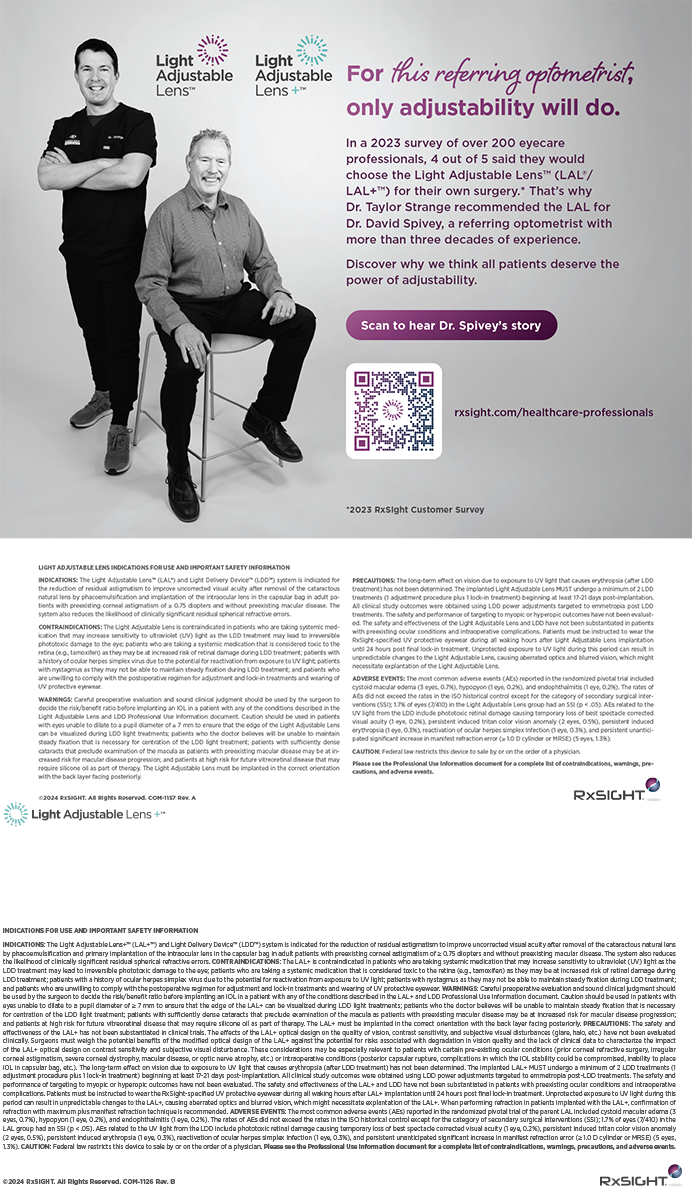The following letter refers to a Point/Counterpoint article entitled ?Physician Certification: A Positive or Negative?? that was written by Lisa Brothers Arbisser, MD, and Mark Johnson, MD, FACS, and appeared in our April 2003 issue.
Mark Johnson's somewhat over-the-top critique of the American Board of Eye Surgery (ABES) presents multiple erroneous assertions.1. ABES was created as a marketing tool to differentiate phacoemulsification from extracapsular cataract extraction. I became certified in 1990 and submitted only extracapsular cataract extraction cases, as did many of my peers.
2. “The founding effort of the ABES failed. Its certification effort affords surgeons no professional prestige and little market advantage.” These criteria, although desirable, are secondary in the ABES hierarchy of concerns. Successful candidates focus on the ABES' primary goal—namely, the provision of quality surgery. And that emphasis ultimately leads to achieving both of the above.
3. “No altruistic purpose.” The ABES and the American College of Eye Surgeons (ACES) continually strive to improve the surgical acumen of anyone, member or otherwise, who wishes to improve his or her skills through surgical mentoring programs and continuing educational efforts provided by members at their own expense. Additionally, we sponsor a videotaped cataract surgery competition for residents that offers a monetary award, a trophy, and practice hardware. We also supply teaching materials to residency programs free of charge.
4. “No purpose for existence.” The ABES and ACES indeed wish this were true. In a positive light, the American Board of Ophthalmology (ABO) has opened a dialogue regarding the evaluation of actual surgical skills as part of its criteria for certification. We would be delighted if the organization were to incorporate our program as part of the ABO certification proper, and we would gladly aid in developing their program. If this were to transpire, then, our purpose in certification would indeed be redundant.
5. “Who could fail such a test?” The answer is many, despite the fact that only more confident and experienced surgeons apply in the first place. The criteria for evaluation of the 50-patient database were predicated on the surgeon's best case selection and refined to a higher standard with this in mind. The videotape evaluation is not based, as Dr. Johnson suggests, on time, incisional size, style of implant, anesthesia, type of blades, method of nuclear disassembly, or IOL insertion devices. Rather, it is based on safe, effective techniques that are appropriate for a given surgical patient and the demonstration of good judgment should a difficulty arise. Many candidates have failed despite not experiencing complications because their techniques, for example, threaten the viability of the endothelium. The presentation of a complication, however, does not fail a candidate. Indeed, many candidates were successful as they demonstrated superior skill and judgment while “under fire” (ie, those circumstances that truly test the applicant and could never be approximated by an oral examination).
6. The failure rate approaches zero. The Board cannot afford turning down an applicant and could not ?afford to face lawsuits by angry, rejected applicants.? Dr. Arbisser quotes a 17% failure rate, which makes sense, since the candidates for certification are not selected at random, are voluntarily submitting to this examination, and most likely are reasonably competent. The Board has failed many candidates, remains solvent, and indeed has survived despite past legal action against it.
7. We already have a system in place. Yes, a system that requires only 25 cataract cases over 3 years, with absolutely no attempt to standardize the evaluation of surgical skills, and has never disallowed ABO certification, would release the surgically incompetent on the public.
8. “Someday, perhaps, a meaningful form of surgical credentialing will be developed.” We must begin somewhere and refine the process rather than condemn it with ill-informed and derogatory rhetoric. Should Dr. Johnson have constructive suggestions that would enhance the ABES' mission of ensuring quality surgery through the certification of actual surgical skills, we would welcome him back to the fold in a heartbeat.
Lance S. Ferguson, MD
Secretary–Treasurer,
American College of Eye Surgeons
Lexington, Kentucky


